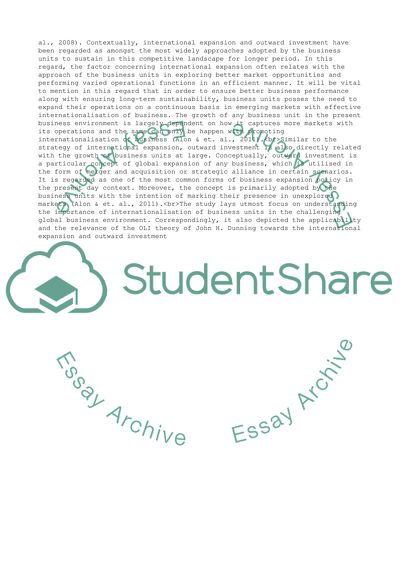Cite this document
(“Is the OLI paradigm developed by John H. Dunning applicable to the Essay”, n.d.)
Retrieved from https://studentshare.org/business/1673205-is-the-oli-paradigm-developed-by-john-h-dunning-applicable-to-the-international-expansion-and-outward-investment-behaviour-of-mainland-chinese-multinational-enterprises-discuss-this-question-by-comparing-the-cases-of-two-chinese-multinationals-of-your-c
Retrieved from https://studentshare.org/business/1673205-is-the-oli-paradigm-developed-by-john-h-dunning-applicable-to-the-international-expansion-and-outward-investment-behaviour-of-mainland-chinese-multinational-enterprises-discuss-this-question-by-comparing-the-cases-of-two-chinese-multinationals-of-your-c
(Is the OLI Paradigm Developed by John H. Dunning Applicable to the Essay)
https://studentshare.org/business/1673205-is-the-oli-paradigm-developed-by-john-h-dunning-applicable-to-the-international-expansion-and-outward-investment-behaviour-of-mainland-chinese-multinational-enterprises-discuss-this-question-by-comparing-the-cases-of-two-chinese-multinationals-of-your-c.
https://studentshare.org/business/1673205-is-the-oli-paradigm-developed-by-john-h-dunning-applicable-to-the-international-expansion-and-outward-investment-behaviour-of-mainland-chinese-multinational-enterprises-discuss-this-question-by-comparing-the-cases-of-two-chinese-multinationals-of-your-c.
“Is the OLI Paradigm Developed by John H. Dunning Applicable to the Essay”, n.d. https://studentshare.org/business/1673205-is-the-oli-paradigm-developed-by-john-h-dunning-applicable-to-the-international-expansion-and-outward-investment-behaviour-of-mainland-chinese-multinational-enterprises-discuss-this-question-by-comparing-the-cases-of-two-chinese-multinationals-of-your-c.


